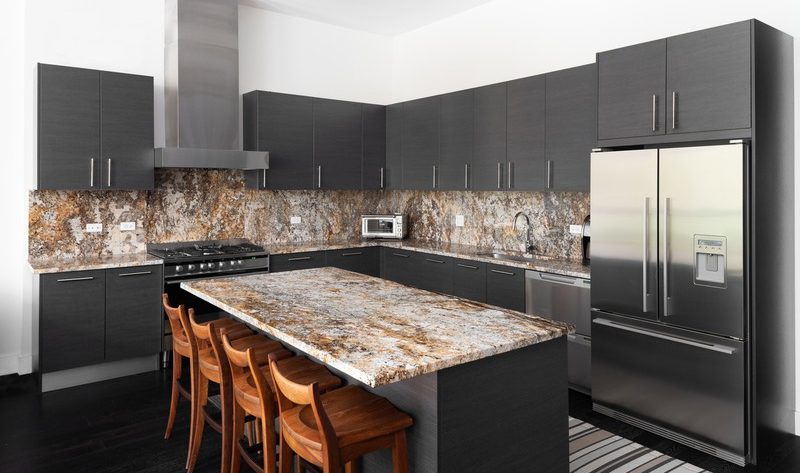When renovating your kitchen, nothing makes as significant an impact as your choice of countertops. They’re not just work surfaces; they set the tone for the entire space. Two of the most popular materials in the world of quality kitchen counters are granite and quartz. Both have their fans and their unique sets of advantages. So, which one is the best choice for your home? In this article, we’ll compare granite to quartz, delve into their pros and cons, and help you make a perfect decision for your kitchen. Strap in, and let’s discover what each option brings.
Pros of Granite Countertops
Granite is the traditional choice for high-end kitchen countertops due to its natural beauty and uniqueness. Each slab is one-of-a-kind, with patterns and colors that can’t be replicated. Here are some other benefits:
-
Durability: Granite is tough. It stands up well to heavy use, resists scratches, and, when properly sealed, is also resistant to stains.
-
Heat Resistance: You can place hot pots and pans directly onto granite without worrying about damage.
-
Value Addition: Granite countertops can add value to your home as homebuyers often seek them.
-
Variety: With its wide range of patterns and colors, you will surely find a granite countertop that matches your kitchen’s decor.
Cons of Granite Countertops
While granite countertops have their advantages, there are a few considerations you should keep in mind:
-
Maintenance: Granite must be sealed regularly to prevent staining and bacteria growth.
-
Price: It can be pricey, especially for more unique patterns and colors.
-
Weight: Granite is heavy, which may require additional support structures, particularly for large islands or spans.
Best Uses of Granite Countertops
Granite is ideal for homeowners who appreciate the natural variance and are looking for a unique, durable surface. It’s an excellent choice for nearly all kitchen styles, from rustic to contemporary.
Consistent Beauty and Low Maintenance
Pros of Quartz Countertops
Quartz is a man-made product that has gained popularity due to its durability and the consistency of its appearance. Here’s what you can expect from quartz countertops:
-
Durability: Quartz is incredibly durable and less prone to cracking or chipping than natural stone.
-
Maintenance: Quartz is non-porous, so it doesn’t require sealing and is easy to clean.
-
Consistent Color and Pattern: If you’re looking for a uniform appearance, quartz is ideal since it lacks the natural variations of granite.
-
Design Options: Because it’s engineered, quartz can be produced in a vast range of colors and patterns.
Cons of Quartz Countertops
Quartz is an excellent material for countertops, but here are a few drawbacks:
-
Less Heat Resistant: Quartz can be damaged by excessive heat, so use caution with hot pots and pans.
-
Not as Unique: Some homeowners may prefer the natural irregularities and unique properties of granite.
-
Price: While comparable to granite, quartz can also get pricey, particularly for premium designs.
Best Uses of Quartz Countertops
Quartz countertops are perfect for those who want a modern look and minimal maintenance. It’s a popular choice for homeowners who want a consistent and upscale appearance throughout the kitchen.
Factors to Consider When Choosing Countertops
Before we compare kitchen countertops further, let’s consider what factors play into choosing the suitable surface for your home:
-
Lifestyle: Think about your daily routines. Do you cook a lot? Are there young children who might spill or make other messes?
-
Budget: Be clear on how much you’re willing to spend. This will immediately narrow down your options.
-
Aesthetics: What’s your style? Do you prefer the natural, varied look of stone, or do you lean towards a more uniform, engineered appearance?
-
Longevity and Maintenance: Consider how much effort you’re willing to put into the upkeep of your countertops.
If you need to outfit other kitchen parts, click here to learn more about kitchen cabinets and how they can complement your countertop selection to create a cohesive look.
Comparing Maintenance and Durability
When investing in quality kitchen countertops in Montgomery County, maintenance and durability are critical. Granite, while durable, needs periodic resealing to combat its porous nature and prevent staining. Quartz, on the other hand, is non-porous, making it highly resistant to staining and bacterial growth, therefore requiring less maintenance. Both materials are sturdy, but quartz is often preferred for its consistency in strength.
Design Considerations
Your kitchen’s design is an extension of your style. The slabs are unique with granite, and you’ll have to choose them in person to ensure they match your vision. In contrast, quartz countertops in Bucks County, PA, offer a controlled look with a wide range of color options, ensuring you get precisely what you want without surprises.
Budget-Friendly Options
While granite and quartz can be investment pieces, options are available for those on a budget. Granite can sometimes be cheaper if you choose a standard color or pattern. Similarly, quartz has a range of prices depending on the quality and design, so it’s possible to find a more affordable option without sacrificing appearance and quality.
Environmental Impact
If you’re environmentally conscious, you might favor granite since it’s a natural stone and doesn’t require much processing. Quartz, however, is engineered and combines natural quartz with polymer resins, which does have a manufacturing impact, although some brands use recycled materials.
Final Thoughts
Granite and quartz are both great for countertops. Granite looks natural and earthy, and quartz has a tidy, modern style that’s simple to keep clean. Think about what you like more and what negatives you can handle. The perfect countertop depends on your personal style, what you need, and how you use your kitchen. To choose the right one for your home, think about these tips, check out showrooms, or get advice from designers.





